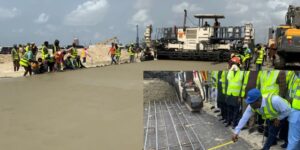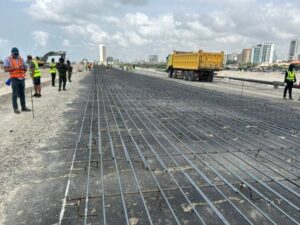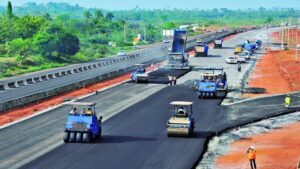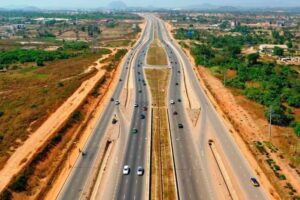Fact-based rebuttal article, drafted to address Otunba (Dr.) Abdulfalil Abayomi Odunowo’s piece, while affirming the infrastructural progress under President Bola Ahmed Tinubu’s administration.
Otunba (Dr.) Abdulfalil Abayomi Odunowo’s piece
Enough is Enough: Fix the Federal Roads in Southern Nigeria Now
By Otunba (Dr.) Abdulfalil Abayomi Odunowo
For far too long, the federal roads across Southern Nigeria have been allowed to collapse into total disrepair, revealing an alarming neglect that raises serious questions about our governance system. What should be engines of commerce and mobility have now become death traps, wrecking vehicles, claiming innocent lives, and crippling regional economies. The urgency of this situation can no longer be overstated. It is time for us to reflect on the state of our federal highways and, more importantly, to demand action from those tasked with maintaining them.
Take, for instance, the Ijebu-Ode to Ibadan federal road. It stands as a prime example of the negligence that characterizes the state of our infrastructure. This route is crucial not only for daily commuters but also for commercial activities that are vital to the livelihood of many in the region. However, it is now criminally abandoned a shocking paradox that highlights the disjunction between the vital role these roads play and the reality of their condition. Drivers journey along this stretch with their hearts in their mouths, fearful not only of the drastic toll the poor conditions take on their vehicles but also of the imminent danger posed by potholes and crumbling shoulders. Tragically, fatalities occur here almost daily, leaving grieving families in their wake and devastated businesses struggling under the burden of collapsed supply chains.
The plight of the Ijebu-Ode to Ibadan road is mirrored in the experiences of many others across Southern Nigeria. Every state Oyo, Osun, Ekiti, Delta, Edo, Enugu, Ondo, and Anambra seems to share a common narrative steeped in neglect. From massive potholes that resemble craters to flooded sections that turn roads into rivers during the rainy season, these federal highways have become marred by sheer abandonment. Impassable bridges, which used to connect communities and foster economic growth, now impose unwarranted economic hardship on residents and businesses alike.
In light of these grave concerns, we must ask an important question: What has the Ministry of Works delivered in Southern Nigeria in the last two years? Are there any projects to show for that period, any tangible evidence of an effort to rectify this crisis? If such projects exist, let them be brought to light for scrutiny and accountability. However, if none can be identified, then we must unambiguously declare that this failure is unacceptable and it must be corrected now.
We face a critical juncture that calls for a collective awakening and a rallying demand for equity and accountability. The people of Southern Nigeria deserve roads that are safe, functional, and federally maintained. We witness significant infrastructure investments in other regions, and it is high time that the federal government extends the same consideration to the South. It is unacceptable for the infrastructure that supports our daily lives and economic activities to be relegated to a second-class status simply because of regional neglect.
Moreover, the ramifications of this infrastructural decay extend far beyond just transportation. It affects education, healthcare access, and the overall quality of life for citizens. Children struggle to commute to school, patients are delayed in reaching medical care, and businesses face mounting logistical challenges. The decay of our roads inevitably leads to a diminishing quality of life, one that trends downward as the very fabric of our society continues to fray.
The hourglass of patience has run dry, and we can no longer tolerate excuses or procrastination. The cries for help from the people of Southern Nigeria must resonate loudly enough to reach those in positions of power. It is imperative that the federal government prioritizes the urgent repair and maintenance of federal roads, steering consistent funding, resources, and attention toward this critical issue.
Let us point the spotlight on this disgrace, as we insist on becoming agents of change. No more delays. No more excuses. The time to fix these roads is now. Our people’s lives, livelihoods, and future hinge on our collective action and the commitment of those in governance to reinvest in the infrastructure that underpins our existence. In the interest of justice, safety, and progress, let us rise and demand: Enough is enough!
E-Signed
Otunba (Dr.) Abdulfalil Abayomi Odunowo is a public policy analyst, engineer, and the National Chairman of the Asiwaju Ahmed Tinubu Support Group (AATSG). He writes from Lagos.
Reality Check: President Tinubu’s Federal Road Achievements Cannot Be Denied
By Dr. G. Fraser. MFR.
Policy Researcher and Infrastructure Analyst
When public discourse veers into partisan distortion or lacks due context, it becomes necessary to set the record straight. Otunba (Dr.) Abdulfalil Abayomi Odunowo recently published an impassioned article titled “Enough is Enough: Fix the Federal Roads in Southern Nigeria Now”, expressing his frustration over road conditions across the South. While his concerns reflect public sentiment and legitimate frustrations, his sweeping indictment of the Tinubu administration is factually misleading, politically unfair, and strategically shallow.

Let us be clear: the state of many federal roads in Southern Nigeria is deplorable. However, the narrative that the Tinubu administration has failed or shown indifference to this crisis, just two years into office, is unsupported by evidence and tone-deaf to the reality of Nigeria’s complex infrastructure landscape.

The Facts: Tinubu Has Delivered—Even Amid Constraints
Since assuming office in May 2023, President Bola Ahmed Tinubu’s administration has completed no fewer than 260 palliative federal road interventions across Nigeria, according to the Federal Ministry of Works. These are not cosmetic touch-ups but targeted repairs in strategic corridors to restore vehicular mobility and reduce casualties.
More than that, the Tinubu government has initiated over 780 km worth of new major highways, including:
- Lagos–Calabar Coastal Highway (700 km): 30 km commissioned already.
- Sokoto–Badagry Super Highway (1,068 km): Construction ongoing.
- Enugu–Onitsha Expressway: 60+ km already worked on.
- Benin–Asaba Highway, Second Niger Bridge access roads, and more.

These are not marginal projects—they are transformative corridors with long-term economic impact. To accuse the federal government of abandonment while these projects are visibly under construction is not just inaccurate—it risks undermining public confidence in genuine governance efforts.

Decades of Neglect Cannot Be Solved in 24 Months
President Tinubu inherited decades of infrastructure decay, failed project continuity, politicized funding, and weak intergovernmental cooperation. Federal roads like Ijebu-Ode to Ibadan didn’t collapse in 2023. They’ve suffered over 30 years of funding shortfalls, contractor disputes, and institutional bottlenecks that no single administration could resolve overnight.

To blame Tinubu for not completing nationwide rehabilitation within two years is to dismiss the structural realities of governance and set unrealistic expectations. Good policy is rooted in consistency, not miracle-working.
Southern Roads Are Not Being Ignored
Contrary to Odunowo’s claim, Southern Nigeria has been a key beneficiary of Tinubu’s early infrastructure strategy. Consider:
- Lagos–Calabar Highway: One of the most ambitious road projects in West Africa, passing through multiple southern states.
- Second Niger Bridge: While construction began before Tinubu, his administration completed access roads and integration into expressway corridors.
Ongoing interventions in Anambra, Enugu, Delta, Ogun, and Edo—all visible and documented.

This is not a case of selective investment. It is a structured rollout of capital-intensive infrastructure in phases, guided by national planning, not emotion.
Beyond Roads: Tinubu Is Rebuilding Systems
The administration has revived the Abuja Light Rail—a long-abandoned symbol of waste—offering free service to relieve urban congestion. A centralized Presidential Infrastructure Coordination Initiative (PICI) is being set up to harmonize execution timelines, funding, and state–federal collaboration. These are systemic shifts—precisely what past administrations failed to deliver.

In Closing: Criticism Must Be Grounded in Truth
To hold the government accountable is patriotic. But to accuse it unfairly is reckless, especially when the facts show unprecedented work underway. Otunba Odunowo may have meant well, but in choosing to ignore President Tinubu’s early achievements and suggest deliberate regional neglect, he has crossed the line from advocacy into misrepresentation.
The truth is this: Tinubu’s administration is doing more for infrastructure in its first two years than many did in eight. That deserves scrutiny, but it also demands recognition.
Let us remain vigilant, but also fair.

Dr. G. Fraser. MFR
The National Patriots.
Headlinenews.news Special Investigative Report.



